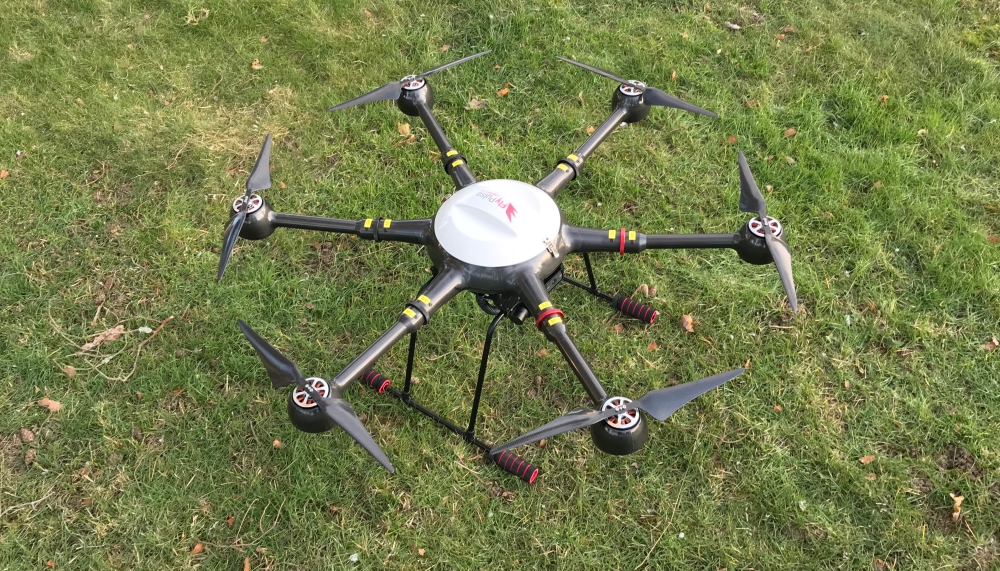Future airports will be more and more automated and remotely controlled, and drones are expected to be integrated with daily operations. A newly granted project ASAS – Airport Surveillance for Airport Safety, led by RISE Research Institutes of Sweden and to be conducted together with LFV (Luftfartsverket), Swedish Regional Airports (SRF), Örnsköldsvik Airport (OER) and FlyPulse will develop and demonstrate drone solutions to help automate daily operations in airports.
With multiple stakeholders from authorities, airports, and related professional domains, the project will identify use cases that address the needs of daily operations at airports, develop and demonstrate drone solutions that help automate the airport operations, improve the airport safety, optimize the resource utilization, and reduce the environmental impacts.
As the first in the world and one big step towards automated airports, LFV introduced Remote Tower Center (RTC) in 2015 with which the traffic control for the OER airport was taken over by Sundsvall/Midlanda airport (SDL) through remote control. Again in 2017, connected vehicles were introduced for improving airport safety based on results from the project DRIWS – Digital Runway Incursion Warning Systems, where physical stop-lights were replaced by digital signals within the vehicles for preventing ground vehicles from approaching the runway without clearance from air traffic control (ATC).
For further development of airport automation, LFV in collaboration with OER airports has initialized a program with the vision of the “Autonomous Airport” within which future-oriented solutions will be tested and evaluated for safe, cost-effective and remotely controlled automated airports. One application area involves the integration of drone solutions in daily airport operations.
Airport inspection includes many routine tasks such as frequent border surveillance of airport fences, wild animal detection and runway surface conditions. These tasks are usually time and labor intensive and introduce emissions when fossil fueled vehicles are in operation.
“Instead of driving a terrain vehicle for checking the airport fences, electrically powered drones could be used for automatic checking, streaming live video to personnel for supervision. This will save considerable amounts of time and daily vehicle driving and thereby reduce costs and vehicle emissions,” says Jonas Didoff, senior advisor at LFV and project manager for DRIWS. “With advanced detection techniques, the system could also alarm the personnel if fence damages or animals are found on the airport perimeters.“
The project leverages years of experiences of drone development at FlyPulse and will deliver drone solutions that are tailored for the needs of airports.
“The airport is a special environment where close interactions with Air Traffic Control (ATC) and authorities are needed. Our drone solutions need to consider the flight schedules and be able to operate day and night, as well as in harsh weather situations,” says Jan Björn, CEO at FlyPulse.
RISE Research Institutes of Sweden is leading the project and will contribute with their competences in wireless communications and automation for the drone solution development, as well as business development for market introduction.
“We need to consider different communication solutions to make sure a certain level of availability and reliability for remote control and data delivery. 5G is one on-going topic which we will have a close look at, especially for use cases at the airports,” says Lei Chen, Senior researcher at RISE. “In addition, we will also investigate a seamless integration of such a solution in the current daily operation procedure and establish an innovation platform for future advanced intelligent functionalities.”
The project will last for 14 months and will have a public demonstration in mid 2019. The project is funded by VINNOVA, Sweden’s innovation agency through its program on future drones.
About RISE
RISE is the Swedish Research Institute and innovation partner. In international collaboration with industry, academia and the public sector, we ensure the competitiveness of the business community and contribute to a sustainable society. Our 2,700 employees support and promote all manner of innovative processes. RISE is an independent, state-owned research institute that offers unique expertise and about 100 testbeds and demonstration facilities, instrumental in future-proofing technologies, products and services. www.ri.se
About FlyPulse
FlyPulse AB is a company based in Trollhättan which focuses on drone system development. The team at FlyPulse has extensive experience from both automotive industry as well as autonomous vehicle and aerospace industries on top of their more than 10 year long dedication to model airplane and drone hobby. FlyPulse has previously been part of successful research projects in drone transport of medical equipment.www.flypulse.se
About LFV (Luftfartsverket)
LFV is an air navigation service provider for civil and military aviation offering air traffic management and associated services to our customer. Research and development are important to LFV, to be able to provide smart solutions for tomorrow’s aviation. Remotely operated air traffic management is a new method of managing air traffic, first developed by LFV and currently attracting global attention. LFV has around 1,100 employees and a turnover of SEK 3.1 billion.
About Örnsköldsvik airport (OER)
OER airport AB is a municipal company owned by Örnsködsvik municipal group. With around 100 000 passengers every year, OER airport is the gate to the region with strong business activities. Being the first in the world, OER airport connected to remote tower services introduced by LFV in 2015, and since then air traffic control has been done remotely in the remote tower center in Sundsvall.
OER is presently developing a test-site for the “Autonomous Airport” in collaboration with LFV.
About Svenska Regionala Flygplatser (SRF)
Svenska Regionala Flygplatser (SRF) is a cooperation organization for Sweden’s non-governmental airports. SRF works to develop air traffic and thus accessibility for all Sweden’s regions. SRF works by influencing the government and the relevant state authorities to provide the prerequisites for non-governmental airports to preserve and develop their operations. SRF currently has 32 member airports that are located all over the country from Pajala in the north to Kristianstad in the south. www.flygplatser.se
Source: Press Release



Great enterprise